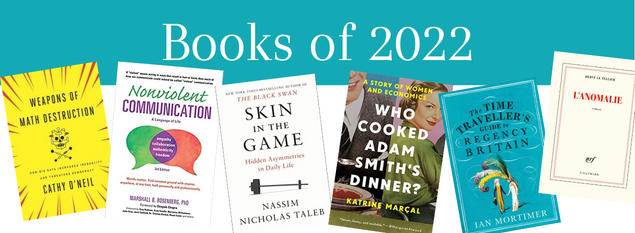In 2022 I read 62 books. Well, I finished 62 of them. I know this because I track what I read on goodreads. This is my shelf from 2022.



Out of 62, I think it would be fair to mention 10% that were worthwhile. Anything less and I will be ignoring some really good books for the sake of an arbitrarily shorter list.
As a unique feature this year, I seem to have shortlisted books that can very pleasantly be read on the kindle. One tiny way I am reducing my impact on the environment: by buying and storing fewer paper books.
Who cooked Adam Smith’s dinner? – Katrine Marçal

I really enjoyed this one. It makes the simple argument, that Adam Smith’s “economic man” quite forgot – in fact eradicated – any form of rational self-interest in women, because we bleed and have children, and so we must be wired for caring for others rather than motivated by our own gain like a butcher or a baker…
The amusing fact is that Adam Smith, the famous economist, had the luxury of his thoughts and writings, because HIS MOTHER KEPT HIS HOUSE AND COOKED HIS DINNERS.
“Kahneman was awarded the 2002 Nobel Prize in Economic Science, [for his proof that our decisions weren’t objective or rational at all], and one would think this would have been the end of economic man”.
Because “The question of how it could be possible to combine family with work outside the home isn’t a privileged complaint from a female elite that wants to have it all. It is an enormous challenge that affects the entire economy and the entire population.”
This book is only a glimpse at some of the strange things we have been accepting so long.
Find it on Goodreads.
Skin in the Game – Nassim Nicolas Taleb

A slightly more ranty than usual book by Mr.Taleb, where he makes a firm argument for allowing decisions to be made only by people who have skin in the game.
It is full of snarky goodies like “skilled thieves at large should not look like thieves”, and “skin in the game means that you do not pay attention to what people say, only to what they do, and to how much of their necks they are putting on the line”.
Find it on Goodreads.
Weapons of Math Destruction – Cathy O’Neil

Scary book about how mathematical models are being used for evil purposes. Only sometimes intentionally evil, but definitely to the detriment of entire populations linked by their postcodes or poverty levels.
The use case I remember best is how a site where one might go to find information for where to find food stamps will collect that person’s information, and sell it to for-profit universities who aggressively market to these people, sell them education, get them into debt for it, and give them degrees worth nothing in the marketplace. Preying on the less fortunate and less informed.
Grim reading. I would like for all Product Owners, Data Scientists, Analysts of all ilks, and ML programmers to know these use cases by heart and to be able to afford the ethics of taking a stance to avoid perpetuating these detrimental outcomes.
Find it on Goodreads.
The time traveller’s guide to regency Britain – Ian Mortimer

Such a fun read! Full of anecdotes from the Regency period in England. My favourite quote from it must be from Princess Lieven, the wife of the Russian ambassador, who complains about the behaviour she witnesses at an English ball, noting that “So many couples wandered off into the bushes that by the end of the dance almost the only people left in the ballroom were the debutantes, chaperones, and the host.”
Find it on Goodreads.
Non-violent communication – Marshall Rosenberg

An entire book devoted to one fairly simple idea: that better listening for another person’s needs (rather than thoughts, or anger), and expressing our own without judgement, can unlock better communication.
We should pause to 1. Observe what is happening and express it 2. Feel, and name our feeling 3. Express your need, and 4. Make a specific request. For instance, “When I see two balls of soiled socks under the coffee table, I feel irritated, because I am needing more order in the rooms that we share in common. Would you be willing to put your socks in your room or in the washing machine?”
There is a lot more in the book, but the four basic components of NVC are Observe, Feel, Need, Request. And it really does work.
Find it on Goodreads.
L’anomalie – Hervé Le Tellier

My review on Goodreads: “Such a brilliant mindfuck of a book!! Absolutely read it!! Beautifully written too.”. If you can read French, get it in the original. Every work loses something in translation.
Find it on Goodreads.
There were many more reads. Several others I might recommend, like the Agatha Christie mysteries I read. Or the memoir from a woman who was diagnosed with Autism in her forties. Or the two great books about the thinking part of design (strategic design). But I can’t recommend absolutely everything, can I?
I do keep a list of Books Worth Reading on Goodreads though, and if you have fun talking to me or reading these posts, you might enjoy some of the books I enjoyed too.

